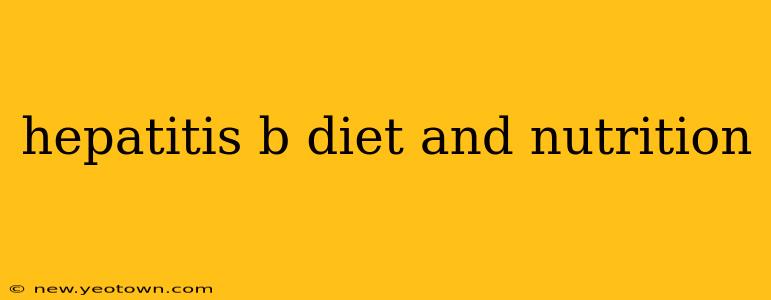Hepatitis B, a viral infection affecting the liver, can leave you feeling drained and unwell. While medication plays a crucial role in managing the condition, nutrition plays a surprisingly significant part in supporting your liver's recovery and overall well-being. This isn't about a strict "Hepatitis B diet," but rather about nourishing your body with the right foods to optimize liver function and boost your immune system. Think of it as fueling your body's natural healing process.
My name is Alex, and I've been researching and writing about liver health for over five years. I understand the challenges of living with Hepatitis B, and I'm committed to providing accurate and helpful information. Let's delve into the key nutritional aspects to consider.
What to Eat: A Focus on Liver-Supporting Nutrients
Your journey to better health starts with understanding what foods can positively impact your liver. Imagine your liver as a hardworking machine – it needs the right fuel to run efficiently.
High-Fiber Foods: Think of fiber as your liver's best friend. It helps regulate cholesterol levels, supporting overall liver health and reducing the burden on your liver. Foods rich in fiber include fruits (berries, apples), vegetables (broccoli, spinach, carrots), and whole grains (oatmeal, brown rice).
Lean Protein: Protein is essential for repairing and rebuilding cells, including those in your liver. Opt for lean sources like fish (salmon, tuna), poultry (chicken breast, turkey), beans, and lentils. Avoid processed meats, which can put extra strain on your liver.
Healthy Fats: Not all fats are created equal. Unsaturated fats, found in avocados, nuts (almonds, walnuts), seeds (chia, flax), and olive oil, are crucial for liver function and overall health. They help protect your liver cells and support nutrient absorption.
Fruits and Vegetables: These are packed with vitamins, minerals, and antioxidants that bolster your immune system and help your body fight off infection. Aim for a rainbow of colors on your plate to maximize the benefits.
What to Limit: Reducing the Strain on Your Liver
Just as important as what you eat is what you avoid. Certain foods can put extra pressure on your already working liver.
Processed Foods: Processed foods are often high in unhealthy fats, sugar, and sodium, which can overload your liver and hinder its ability to function effectively. Minimize your intake of fast food, packaged snacks, and sugary drinks.
Alcohol: Alcohol is a major toxin for your liver. If you have Hepatitis B, completely avoiding alcohol is crucial to prevent further damage.
High-Fat Foods: While healthy fats are vital, excessive intake of saturated and trans fats (found in fried foods, red meat, and processed snacks) can impede your liver's ability to process them, potentially leading to further complications.
Frequently Asked Questions (FAQs)
Here are some common questions regarding Hepatitis B and diet, answered with clarity and precision.
Is there a specific diet for Hepatitis B that guarantees a cure?
There's no magic diet that cures Hepatitis B. However, a balanced and nutritious diet, focusing on liver-friendly foods and limiting harmful substances, significantly supports your liver's function and overall health. It's a vital part of a comprehensive management strategy alongside medical treatment.
What vitamins and supplements should I take?
While a healthy diet should provide most of the essential nutrients, some people might benefit from specific supplements. However, always consult your doctor or a registered dietitian before taking any vitamins or supplements, as some may interact with your medication. Self-treating can be harmful.
Can a poor diet worsen Hepatitis B?
Yes, an unhealthy diet high in processed foods, unhealthy fats, and alcohol can significantly worsen the condition by adding stress to your already compromised liver. Maintaining a nutritious diet is a key aspect of managing your Hepatitis B.
How much water should I drink?
Staying adequately hydrated is vital for overall health and liver function. Aim for at least eight glasses of water daily.
Should I follow a specific weight management plan?
Maintaining a healthy weight is particularly important if you have Hepatitis B. Consult your doctor or a registered dietitian for personalized guidance on weight management. Losing weight too quickly can be detrimental, so gradual changes are best.
Conclusion: Nourishing Your Way to Better Health
Living with Hepatitis B presents unique challenges, but with the right approach, you can actively support your liver's health. A well-planned diet, combined with medical treatment and a healthy lifestyle, empowers you to take control of your well-being. Remember, the information here is for general knowledge and should not be taken as medical advice. Always consult your healthcare provider for personalized guidance tailored to your specific situation. Your health journey is a marathon, not a sprint. Take it one step at a time, nourish your body, and focus on living a healthy, fulfilling life.

